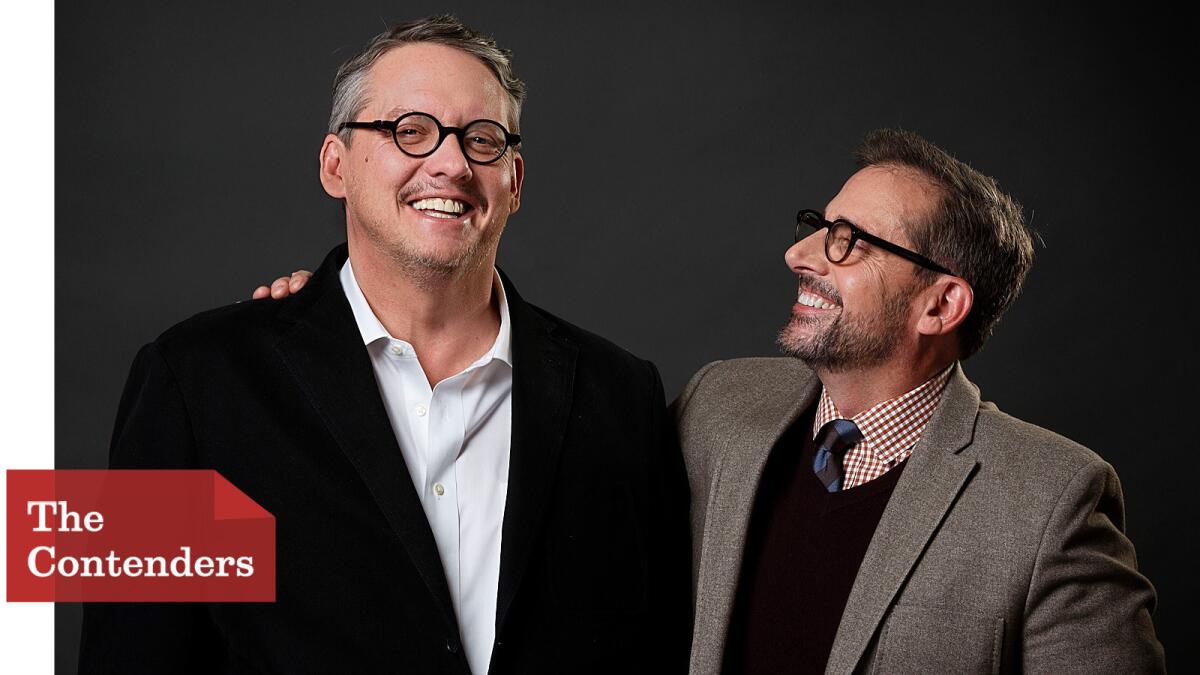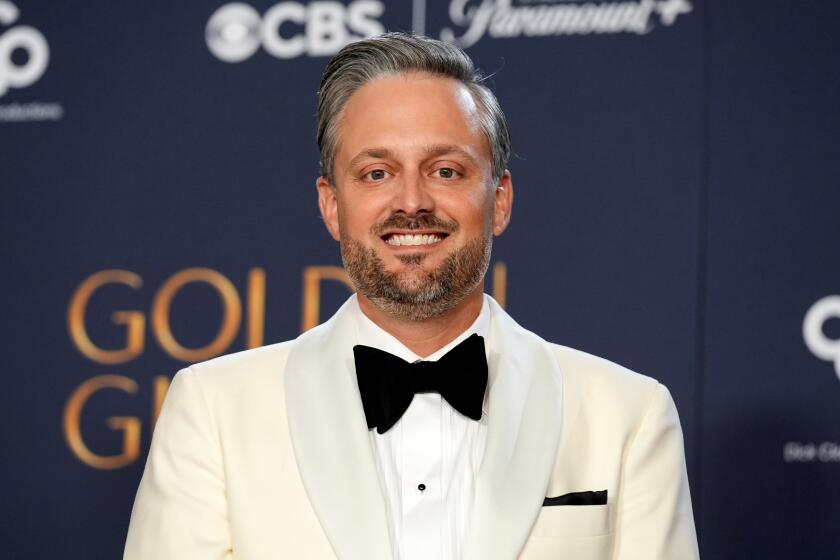Director Adam McKay and Steve Carell cash in on 25 years of funny friendship in ‘The Big Short’

- Share via
Steve Carell and filmmaker Adam McKay go back 25 years to Chicago when Carell was tearing it up with the celebrated Second City improv group and McKay was making a name for himself as a writer and performer with the Upright Citizens Brigade. McKay eventually found his way to Second City, landing in the same company as Carell’s wife-to-be, Nancy. “Everyone knew Adam was a special talent back then, super smart, super funny, clearly the head of his class,” says Carell, who, a quarter of a century later, can still reel off, in great detail, McKay’s envelope-pushing work.
Their paths crossed again when McKay cast Carell as dimwitted weatherman Brick Tamland in “Anchorman: The Legend of Ron Burgundy,” the 2004 absurdist farce that jump-started both their film careers. Ten years later, McKay thought of Carell for the role of a cynical hedge-fund manager in his new film, “The Big Short,” a caustic, adrenalized comedy of outrage, based on the Michael Lewis bestseller about Wall Street outsiders who believed a subprime mortgage bubble existed, bet against the housing market and won big when the economy collapsed in 2008. Christian Bale, Ryan Gosling and Brad Pitt (among others) play the other number-crunching crusaders and/or cynics.
SIGN UP for the free Indie Focus movies newsletter >>
It’s easy to see why Carell and McKay connect. They each take an analytical approach to comedy but are more than willing to play it loose in the service of a joke. They’re not afraid of looking stupid because sometimes that’s the point, though not everyone gets that. Which is fine. Their comedy works on multiple levels. Both men also have a reputation for being decent human beings more demanding of themselves than others. Except if you’re an unethical banker. Or a politician taking money from banks. Then you’re in trouble.
They talked with The Envelope recently about their friendship and work together.
This movie asks you to root for these guys to be right and win, even though their victory means awful things for just about everyone else.
McKay: I love that ambiguity. Our society, we love facts and clarity. And these were the guys who didn’t buy into the nonsense. The white noise missed them. So of course we’re rooting for them. We want truth to win. But unfortunately, halfway through they realize the truth is the system is 100 times more compromised than they imagined. And that in fact by them winning they’re actually going to lose. To this day when you meet these guys, they have this anger and this disappointment almost like a 1,000-yard stare. It’s easy to look at them and say, “Oh, they made a bunch of money. Everything’s fine.” But what I love about this story is that it’s not all about money. For these guys, it shattered their belief system.
Carell: I met Steve Eisman, the man my character is based on, and talking to him that conflict came through. This was a man who was torn between his job and his ideology. He had a lot of anger — still does.
That anger comes through and spills over to people watching the movie. It’s like the opposite of a crowd-pleaser …
Carell: A crowd-infuriater!
And part of that anger comes from what happened. And part of it comes from the fact that nothing was done about the fraud and idiocy and this whole thing might very well happen again.
McKay: I actually saw a car ad the other day: 72 months, 0% APR, 20% cash back on the sticker price. I thought, “Wait. You buy the car and they give you $5,000 on top of that. Then you pay no interest for 72 months? There’s just no way that is good.”
Carell: Where is this car? I want to get in on this because I think you’re confusing it. That’s a sweet deal.
Going back to Chicago, did you guys first meet through Steve’s wife, Nancy?
Carell: Yes. My wife-to-be. My now-wife. Then-girlfriend.
McKay: Steve had an arranged marriage. So it was his wife, age 3. He knew she was going to be his wife.
I had auditioned for Second City and became a scrawny, 24-year-old understudy for Steve’s cast — which he has no memory of. I remember improvising a scene with [Stephen] Colbert, playing John Wilkes Booth auditioning for a role before I shot the president. I did it like a bad De Niro, New York actor.
The first time we actually worked together was in a touring company show in Dallas. He was [there] visiting Nancy. We were like, “Holy …, Steve Carell’s here. Let’s get him in something.” So we ended up doing this crazy piece where we pulled him out of the audience, like he was a regular audience member, and then just did like the Milgram experiment — that’s the shock one, right? — on him for 20 minutes. We pulled him up, humiliated him and then revealed he was part of the cast.
And the audience hated us.
Carell: That was what’s so special about Adam. He does things you’ve never seen before. There was a character Adam played called the “mocktor.” He would give terrible medical news to people, let them react emotionally, and then very subtly mock them.
Everyone asks me if I think Adam is a surprising choice to direct [“The Big Short”]. I don’t think anyone who knows him is surprised at all. It seems a completely logical path.
McKay: The form of “The Big Short” came from those improv days, doing things like breaking the fourth wall, monologues coming out of scenes, constantly shifting gears and personally addressing and challenging the audience.
“Anchorman” marked the first time most people saw you two collaborate. Was casting Steve a no-brainer?

The Envelope gathers some of the leading Oscar contenders for lead actor to chat about their roles and the industry: Steve Carell, Bryan Cranston, Michael Caine and Samuel L. Jackson.
McKay: It came down to Steve and one other guy for the role of Brick Tamland. And Will [Ferrell] and I were in the room and I said … [turning to Carell] … you know this story, right? I said, “Will, I’ve never seen Steve Carell not be funny. Not once ever.” And Will goes, “Good enough for me.” And that’s how you got cast.
Carell: Oh my God. I didn’t know. Shooting that movie felt like we were getting away with something.
McKay: Ferrell and I had been trying to make it for years and being told no. So on that first day, it was, “Oh my God. They’re giving us professional cameras and beautiful sets.” It felt insane. We had never done a movie. We didn’t know movies were supposed to be stressful, that the director yells at people.
You had to learn that. Now you know.
McKay: Now I get to exercise my authority. People better not make eye contact!
Carell: Adam will be self-deprecating but that sense of generosity of spirit and kindness, it trickles down. Everyone knows, if nothing else, making a movie with him is going to be enjoyable. And that takes so much of the pressure off. With a movie like “The Big Short,” it’s uncharted territory. It’s absurdist and some of it seems kind of crazy and you don’t know if it’s going to work, but it seems exciting. With him at the helm, you were supported.
McKay: The thing about seeing Steve on this, I always knew he was a master comedy technician who can give you 20, 30 marvelous ways to read a line …
Carell: (Affecting awe) I sound very good …
McKay: … and I’ve always seen Steve very focused, but on this one he was like a grim rider. It took me a day to get in sync with him. I’d tell him, “You’re really being hard on yourself. These are good takes.” And he kept saying, “No, no. There’s more here.” And he would find more. So after that first day, I knew where he was trying to go and I could help him. I remember the scene where you learn Morgan Stanley’s down $50billion …
Carell: That was a hard one.
McKay: That was a hard one. The stripper scene was a hard one. We had volume issues, it was a crowded area ...
There was a naked woman …
McKay: There was an attractive naked lady. Ten inches away from Steve. I’d never done nudity before. But I found it’s like being on a topless beach in France. You go, “Oh my God, I’m on a topless beach in France!” And then you immediately get over it.
Was that your experience too?
Carell: Ummmm …
McKay: It’s OK. You can say no. You can say you were pulsing with sensual desire the entire time.
Carell: I tend to over-empathize with people. For example, I was at a Christmas party a few years ago and one of our neighbors got a little tipsy and decided to start singing Christmas carols. Like, solos. And she had a terrible singing voice. I went into a flop sweat. And Nancy said, “Are you OK?” I was smiling and trying to support her, but the situation made me so uncomfortable for her.
So in a similar way, my heart really went out to that actress and I wanted her to feel completely safe and supported. That was my concern.
McKay: That’s Steve. And that’s why he was so right for this character, this angry man of principle, someone cynical but also sad about the system just failing and hurting so many people.
And the audience just loves him. They get that this guy is not going to be polite. He’s our avenging sword, the voice of the people, doing what we want to do.
Have you ever been the voice of the people before?
Carell: Just as Brick. “Anchorman” is Brick’s dream. It’s Brick’s snow globe, if you will.
More to Read
From the Oscars to the Emmys.
Get the Envelope newsletter for exclusive awards season coverage, behind-the-scenes stories from the Envelope podcast and columnist Glenn Whipp’s must-read analysis.
You may occasionally receive promotional content from the Los Angeles Times.







